 W
W"AA UU" is the fourth single by Titãs, released in 1986. Most of this song consists simply of Sérgio Britto screaming "AA", while the other vocalists reply with "UU". The band Símios made a cover of this song. The song was featured on the Rede Globo telenovela Hiper Tensão and on the soundtrack for the 2008 film Meu Nome Não É Johnny. A song they already played in shows before working on the album, it was the first track to be recorded for Cabeça Dinossauro. The track received some airplay, but not without resistance. It only became a hit after its video was broadcast on Rede Globo's Fantástico.
 W
WThe afoxé is an Afro Brazilian musical instrument composed of a gourd (cabaça) wrapped in a net in which beads or small plastic balls are threaded. The instrument is shaken to produce its musical noise.
 W
W"Asa Branca" is a song written by Luiz Gonzaga and Humberto Teixeira in 1947. The asa-branca of the title is the picazuro pigeon. With its departure the desolation of the parched sertão is complete, and the protagonist of the song, unable to make a living, must leave the sertão and his lady-love Rosinha. The song closes with his promise to return.
 W
WBará Berê is the debut album of the Brazilian Sertanejo singer Alex Ferrari released on 18 December 2012 on Ultra Records, and containing the two singles "Bara Bará Bere Berê" and "Guere Guerê". Based on his version of "Bara Bará Bere Berê", the album appeared for one week in SNEP, the French Albums Chart.
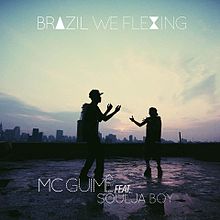 W
W"Brazil We Flexing" is a single by Brazilian rapper MC Guimê, featuring American rapper Soulja Boy.
 W
WBrazilian gaucho music denotes the traditional music of Río Grande do Sul, Santa Catarina and Paraná states, whose population has a strong ancestry of European countries like Portugal, Spain, Italy and Germany. The word gaucho refers to the countryside and farm people.
 W
WThe Canecão is an indoor arena located in Botafogo, Rio de Janeiro, Brazil. The venue opened in 1967 which was capable of functioning alternatively either as a dance floor or a concert hall. It has been closed since 2010, due to legal quarrels over its ownership.
 W
WChocalho is the generic name for "shaker" in Portuguese. It is also called the txequerequetxere in some regions of Catalonia, specifically in Garcia. There are various types of idiophones using this name in Portuguese, not always being the same instrument:a shaker; a kind of jingle stick used to play samba music; a cowbell;
 W
WThe escala nordestina are a body of musical scales commonly used in the music of the Nordeste, the northeastern region of Brazil. The term can apply to several different scales, including the Mixolydian, the Lydian with a flattened seventh, or the Dorian. These three modes have in common the rejection of the use of the major seventh as the leading-tone, generally preferring the more "acoustic and natural" minor seventh. The term northeastern scale is most commonly used to refer to the Mixolydian mode, which is extensively used in baião and frevo music. In Brazilian music, the Dorian mode is formed from the Mixolydian mode, by the lowering of the third, thus being a minor version of the former. The Brazilian Lydian, somewhat less common in practice, is a synthetic scale closely related to the harmonic series.
 W
WFunk paulista, also known as funk ostentação, is a Brazilian music style created in São Paulo in 2008. The central theme addressed in the songs is conspicuous consumption, and many funk ostentação artists sing about cars, motorcycles, drink, women, and ambitions to leave the favela and achieve life goals.
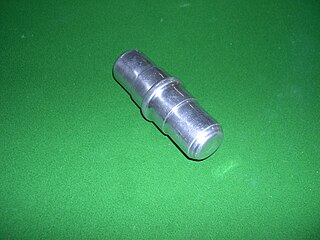 W
WThe ganzá is a Brazilian rattle used as a percussion instrument, especially in samba music.
 W
WGonguê is a Brazilian percussion instrument. It is a type of Cowbell (instrument) consisting of a big, flat iron bell, measuring from 20 to 30 cm, and a cable that serves as a support. The Gonguê is usually played with a metal drumstick, and it is typically used in north-eastern Brazilian music, accentuating the beats and doing rhythmic phrases, generally formed by off-beats and syncopated patterns. To avoid fatigue, players normally support it against the body. Due to its size, the Gonguê has a loud and strident sound, more clangorous than other types of cowbells.
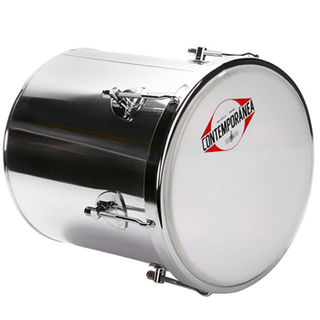 W
WThe hand-repique is a percussion instrument originated in Brazil. It’s a small drum of cylindrical form, that can be made of wood, aluminum or acrylic. It’s played with the hands, both on the skin and its body. The hand-repique has a sharp sound and is used mainly to play Samba and its variants, such as Pagode. Its common role inside these genres is to increase the percussion section, filling up the spaces and playing the off-beats. It was invented by musician Ubirany, founder and percussionist with the band "Fundo de Quintal". The hand-repique is derived from another percussion instrument, the "Repinique". Ubirany started to use the repinique in its band but felt it was too uncomfortable to play, since this instrument is made to be originally played with a drumstick. So he adapted it, adding a few mufflers on the inside, lowering the hoop and taking the bottom skin off it. It became so popular that it began to be produced by several manufactures, evolving away from the original repinique.
 W
WAn Ilú or Ilu is the Yoruba name for a type of Brazilian wooden folk drum, found characteristically in the northern provinces of Pernambuco and Ceará.
 W
W"Não Dá pra Resistir" is a song by the Brazilian girl group Rouge, released on August 19, 2002 as the debut single from the band's debut studio album, self-titled Rouge (2002). Originally a song in English, titled "Irresistible", written by Kara DioGuardi, Frederik Thomander and Anders Wikstrom, it was adapted in Portuguese by Milton Guedes and produced by Rick Bonadio. The original version of the song was later sung by Nikki Cleary and released on her self-titled album, a year after the adapted song released in Brazil.
 W
WPepsi on Stage is a music venue in the city of Porto Alegre, Brazil. It is located in the neighborhood of São João, near the Salgado Filho International Airport.
 W
WThe reco-reco is a scraper of African origin used as a percussion instrument in Brazilian music, but also in many Latin American countries, where it is known as güiro, güira, guayo and guacharaca.
 W
W"Sem Você" is a song by the Brazilian girl group pop Rouge, from their fourth studio album, Blá Blá Blá (2004). The song was written in Spanish by Andrés Constantinidis and Carolina de La Muela, with the title "No Dejo de Sentir", and was translated and produced by Rick Bonadio. The song is a pop rock ballad, which talks about not being able to live without the loved one. The song released on August 2, 2004.
 W
WTagima is a Brazilian guitar manufacturing company based in São Bernardo do Campo, São Paulo. The name Tagima comes from Seizi Tagima , a Japanese descendant who learned to craft guitars just by watching the process.
 W
WA tan-tan is a cylindrical hand drum from Brazil that is used in small samba and pagode ensembles. It imitates the big Surdo which is played by the famous samba baterias. But due to its smaller size the tan tan is not as loud as a surdo and so it is played rarely in big samba schools, but rather within closer gatherings of musicians called Rodas do Chôro.
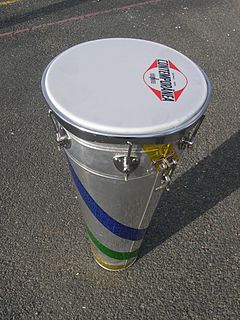 W
WThe timbau or Brazilian timbal is a membranophone instrument derived from the caxambu drum, usually played with both hands. Slightly conical and of varying sizes, it is usually light in weight and made of lacquered wood or metal with a tunable nylon head. It is in the shape of an ice cream cone with the top and the point cut off.
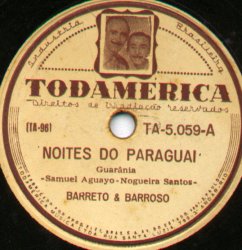 W
WTodamerica Records was a Brazilian record label, in business from about 1950 through the 1970s. The label specialized in Brazilian music and other music of Latin America. Artists who recorded for Todamerica include João Gilberto and Luiz Americano.
 W
W"Vem Habib " is a song by the Brazilian girl group pop Rouge, for the group's fourth studio album, Mil e Uma Noites (2005). It was written by and produced by Rick Bonadio, derives from "arabic pop music", having a totally different rhythm from the previous songs of the group. Columbia Records released "Vem Habib " as the first single from the album on May 23, 2005. The music video of the single is spent in the desert, where they are prisoners of a sultan. The group also sang the song on the Mil e Uma Noites Tour (2005), Chá Rouge Tour (2017) and 15 Anos Tour (2018).
 W
WThe viola de Queluz is a stringed instrument from Queluz, Brazil. It has 12 strings in 5 courses. The lower 2 are tripled and the rest are doubled.
 W
W"Zumbi" is a song by Brazilian samba-rock artist Jorge Ben. It appears on his 1974 album, A Tábua de Esmeralda. Its title refers to Brazilian slave settlement leader Zumbi dos Palmares. The song's lyrics describe the scene of a slave auction, ending with hopeful speculation about what will happen when Zumbi arrives. The refrain "Angola, Congo, Benguela, Monjolo, Cabinda, Mina, Quiloa, Rebolla" evokes the African origins of the slaves up for sale in the song.